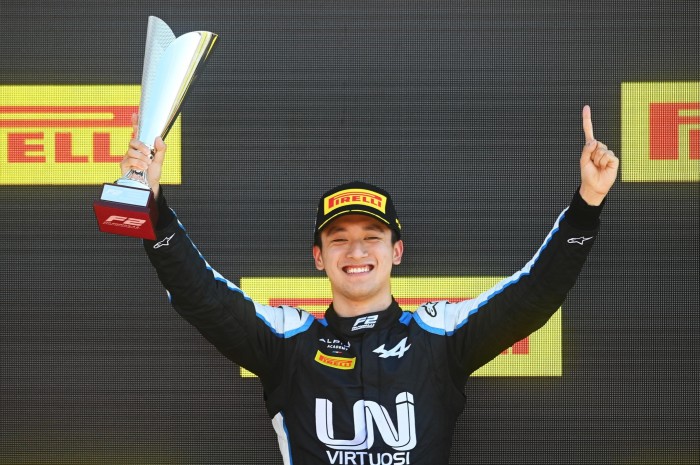F1 driver Zhou Guanyu: ‘I was surprised, how I was able to make the step’

Roula Khalaf, Editor of the FT, selects her favourite stories in this weekly newsletter.
Zhou Guanyu enjoys confounding expectations. Kart racers from China are not commonplace at elite level but, against all odds, he stepped up from the entry level sport to become China’s first Formula One driver last season. He even scored world championship points on his debut. But perhaps nothing sums up the 23-year-old’s mould-breaking achievements better than the time, as a child, he stood on the winner’s podium at a European championship kart race in France. The organisers did not have a Chinese flag to fly above his head. They hadn’t anticipated a Chinese driver winning an elite event.
His journey started early. Typically, when F1 takes its circus to a new host country, throngs of families attend out of curiosity, among them scores of children, who marvel at the noise, speed and intensity of the action and dream of one day becoming an F1 driver. And that was precisely the experience of Zhou in 2004, when he attended the first Grand Prix on Chinese soil in Shanghai as a five year old with his father, watching Ferrari legend Michael Schumacher battling other international stars.
“At the time, I didn’t know anything about racing and Formula One,” he recalls. “It was really exciting; the cars and this loud noise. I just wanted to be one day in these F1 cars, driving around the world by myself — that’s the dream that started to come to my mind.” The following year, father and son returned, this time knowing far more about the drivers and the sport. The idea became cemented in Zhou’s mind, but he quickly realised he would have to move to Europe if he wanted to make the dream a reality.
“I just had the eagerness,” he recalls. “I wanted to achieve. I had to move out of my hometown to go to the UK: it is the most competitive grid in the junior and karting series. This was the only way for me to improve my driving, compete for race victories and adapt myself into a different environment with European drivers.”
Zhou made the unlikely move, aged 12, to Sheffield, the base of the kart team he raced for. He won two major UK karting championships. He sat GCSEs at a local school. Then, after signing for Ferrari’s junior Driver Academy, he terminated his A Level studies and moved to Italy. He made steady progress up the ranks, but took the bold decision to leave Ferrari in 2018 for the Renault Alpine driver programme, which offered more opportunities to drive an F1 car in private tests and to work on the simulator — a vital development tool for today’s driver.

Zhou was, by now, racing in Formula Two, just one step away from his dream of F1. But this is the largest, most difficult step and one most drivers never get to take. He stayed in F2 for three seasons, trying to earn enough race wins and points to qualify for an FIA Super Licence, without which the door to F1 is closed.
At the end of relatively successful 2021 season with four wins, he was announced as an F1 driver for 2022 with Alfa Romeo Sauber. His team mate would be Valtteri Bottas, who had been Lewis Hamilton’s team mate for five years at Mercedes, winning 10 Grands Prix. Bottas would serve as an ideal benchmark for the newcomer. But, first, there was the controversy that accompanied the announcement that Zhou — and not the dominant 2021 F2 champion Oscar Piastri — had won the drive.
The incumbent driver at Sauber whom Zhou replaced, Antonio Giovinazzi, posted ungracious comments on social media about money (especially the pipeline of Chinese sponsors looking to reach a global market) being the sole rationale for Zhou’s F1 appointment. However, Piastri defended his fellow driver, calling the criticism “pretty unfair”.
Meanwhile, Alfa Romeo Sauber team principal at the time, Fred Vasseur, who in a previous role had masterminded the junior career of Lewis Hamilton, pointed out that the F2 races Zhou had won, in Bahrain, Monaco and Silverstone were “the most demanding tracks in F2.”
That first season in F1 for Zhou was a whirlwind, but scoring points on debut settled the nerves and, soon, he began to perform well against Bottas. By the end of the season, he had beaten the Finn for raw speed in qualifying eight times in 22 Grands Prix — again confounding expectations, given their relative experience.
“I was a bit surprised how I was able to make the step,” he says. “I expected maybe to be scoring points later in the season. But I was able to score points on my race debut. And, then, we continued reducing the gap between me and Valtteri; from seven tenths [of a second per lap], then six tenths until I was quicker.”
But while he is now settled in F1, and feels like be belongs, his dream of racing in front of Chinese fans at his home Grand Prix will have to wait one more year. The Chinese government cancelled this year’s race, scheduled for April, due to lingering Covid concerns.
“Racing at home, it’s very important for me, for our country, just bringing the popularity of Formula One,” he says. “The crowd when we go back next time is going to be fully packed, very exciting. The dream of racing at the same circuit, watching as a child, in front of the home fans, hasn’t changed.”
Comments